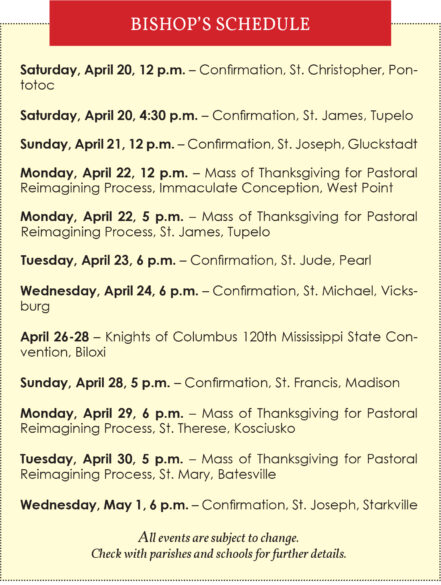By Bishop Joseph R. Kopacz, D.D.
“Repent, therefore, and be converted, that your sins may be wiped away, and that the Lord may grant you a season of refreshment.” (Acts of the Apostles 3:19-20)
During this Easter season there will be additional opportunities in each of our six deaneries to further the conversations in our undertaking of Pastoral Reimagining process. To apply the phrase from the Scriptures by St. Peter in the passage above, another way of expressing the goal of our process is to advance toward a season of refreshment and renewal under the gaze of One, Holy, Catholic and Apostolic.

Although the process was organized from the diocesan center, the handiwork has taken place on the local level with conversations for the sake of reimagining of what could be, building upon the diocesan and world-wide undertaking of Synodality in the Catholic Church.
It must be a grassroots process in order for the diocesan center to engage in authentic listening and conversation with all points on the compass. In other words, “whoever has ears ought to hear what the Spirit is saying to the churches.” (Acts 3:22) The Lord himself expressed spiritual and pastoral potential “…they might see with their eyes, hear with their ears, understand with their hearts and turn, and I would heal them.” (Matthew 13:15)
Not surprisingly, healing and greater unity were a repeated theme during our diocesan synodal process, both for our church and society. Another expressed desire was for a more meaningful understanding and application of the Bible, the sacred word of God. All this is seen and heard on Divine Mercy Sunday from the scriptures, in the Eucharist, and in the recitation of the Chaplet.

In the classic resurrection appearance, the Lord was suddenly in the midst of his scattered and fearful apostles and immediately blessed them with peace, in fact, three times over two encounters. He proceeded to breathe upon them the power of the Holy Spirit for the forgiveness of sins, theirs and all who would hear the Gospel and come to faith. With God’s grace in abundance, he sent them into the world so that “all may have life in his name.” (John 20:19-31) This is a Gospel account of healing and hope in the aftermath of the trauma of the violent crucifixion, and the division and conflict that come from such events. Many in our society and church are reeling from similar turmoil.
From Divine Mercy Sunday in the tradition of the beloved disciple John we heard in the second reading that this is the power, “that came through water and blood, Jesus Christ. The Spirit is the one that testifies, and the Spirit is truth.” (1John 5:6) Water and the blood, the blue and the red rays from the side of the crucified and resurrected One, Divine Mercy. The good fruit of all of this is heard and imagined from the first reading on Divine Mercy Sunday.
“The community of believers was of one heart and one mind … With great power the apostles bore witness to the power of the resurrection, and there was no needy person among them.” (1Acts 4:33-35)
This is the paradigm Christian community, strong in faith, hope and love, an ideal for sure, but also real on many levels. Although not formally expressed until the year 325 in the Nicene Creed, it is clear that One, Holy, Catholic and Apostolic were unfolding at the beginning.
The process of Reimagining in our diocese is a hope that is ever ancient and ever new. “Late have I loved you, O Beauty every ancient, ever new…” (Saint Augustine, Confessions)
We want to see, hear, and understand the power of the Lord’s resurrection, his peace, his mercy, his call and mission for our lives, in our parishes, schools and ministries. Overall, the new life of Eastertide, a season of refreshment, by God’s grace, is producing the good fruit from the efforts of reimagining in our diocese. Let us continue to fight the good fight of faith, “the power that conquers the world.” (1John 5:4)
